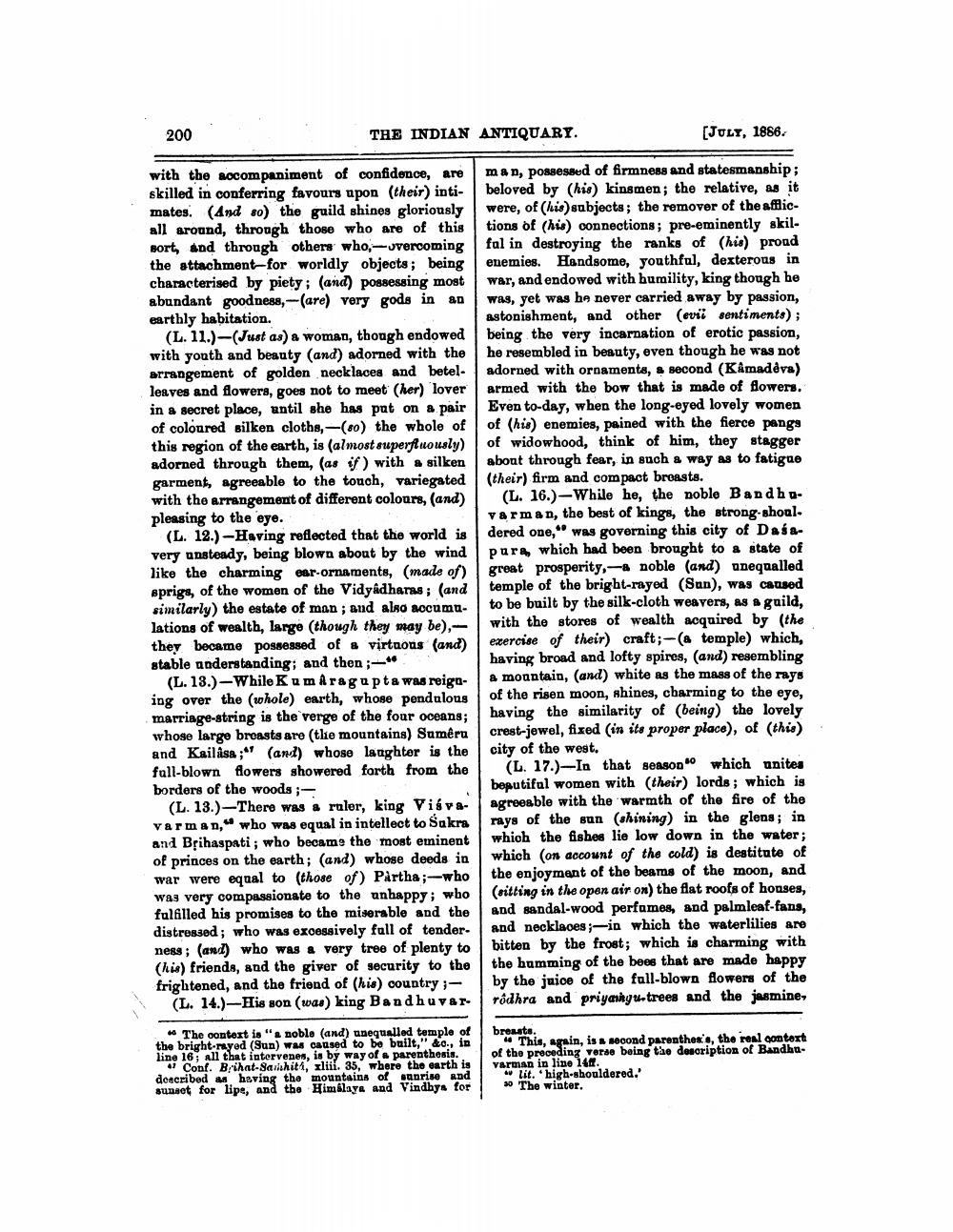________________
200
THE INDIAN ANTIQUARY.
[JULY, 1886.
with the socompaniment of confidence, are skilled in conferring favours upon (their) intimates. (And so) the guild shines gloriously all around, through those who are of this Bort, and through others who, -vercoming the attachment-for worldly objects; being characterised by piety; (and) possessing most abundant goodness,-(are) very gods in an earthly habitation.
(L. 11.)-(Just as) a woman, though endowed with youth and beauty (and) adorned with the arrangement of golden necklaces and betelleaves and flowers, goes not to meet (her) lover in a secret place, until she has put on a pair of coloured silken cloths, -(80) the whole of this region of the earth, is (almost superytuously) adorned through them, (as if) with a silken garment, agreeable to the touch, variegated with the arrangement of different colours, (and) pleasing to the eye.
(L. 12.) -Having reflected that the world is very unsteady, being blown about by the wind like the charming ear-ornaments, (made of) sprigs, of the women of the Vidyadharas; (and similarly) the estate of man; and also accumulations of wealth, large (though they may be), - they became possessed of a virtaons (and) stable understanding; and then ;-* '
(L. 13.)-While Kum Aragupta was reigaing over the (whole) earth, whose pendulous marriage-string is the verge of the four oceans; whose large broasts are the mountains) Sumêru and Kailasa ;"' (and) whose laughter is the full-blown flowers showered forth from the borders of the woods ;
(L. 13.)-There was a ruler, king Visvavarman, who was equal in intellect to Sakra and Brihaspati ; who became the most eminent of princes on the earth; (and) whose deeds in war were equal to those of) Partha ;-who was very compassionate to the unhappy; who fulfilled his promises to the miserable and the distressed; who was excessively full of tenderness ; (and) who was a very tree of plenty to (his) friends, and the giver of security to the frightened, and the friend of (his) country
(L. 14.)-His son (was) king Bandhuvar
man, possessed of firmness and statesmanship; beloved by (his) kinsmen; the relative, as it were, of (his) subjects; the remover of the afflictions of (his) connections; pre-eminently skilfal in destroying the ranks of (his) proud enemies. Handsome, youthful, dexterous in war, and endowed with humility, king though he was, yet was ba never carried away by passion, astonishment, and other (evii sentiments); being the very incarnation of erotic passion, he resembled in beauty, even though he was not adorned with ornaments, second (Kamadeva) armed with the bow that is made of flowers, Even to-day, when the long-eyed lovely women of (his) enemies, pained with the fierce pangs of widowhood, think of him, they stagger about through fear, in such a way as to fatigue (their) firm and compact broasts.
(L. 16.)-While he, the noble Bandhovarman, the best of kings, the strong shoul. dered one," was governing this city of Daiapurs, which had been brought to a state of great prosperity,-& noble (and) unequalled temple of the bright-rayed (Sun), was caused to be built by the silk-cloth weavers, as a guild, with the stores of wealth acquired by the exercise of their) craft;-(a temple) which, having broad and lofty spires, (and) resembling a mountain, (and) white as the mass of the rays of the risen moon, shines, charming to the eye, having the similarity of (being) the lovely crest-jewel, fixed in its proper place), of (this) city of the west.
(L. 17.)-In that season which unites beputiful women with (their) lords; which is agreeable with the warmth of the fire of the rays of the sun (shining) in the glens; in which the fishes lie low down in the water; which on account of the cold) is destitute of the enjoyment of the beams of the moon, and (mitting in the open air on) the flat roofs of houses, and sandal-wood perfames, and palmleaf-fans, and necklaces ;-in which the waterlilies are bitten by the frost; which is charming with the humming of the bees that are made happy by the juice of the full-blown flowers of the ródhra and priyayu- trees and the jasmine,
- The context is " noble (and) unequalled temple of the bright-ryad (Sun) was caused to be built," &o, in line 16; all that intervenes, is by way of parenthesis.
Conf. B Chat-Sarichiti, xliii. 35, where the earth is doscribed as having the mountains of sunrise and sunset for lipe, and the Himalaya and Vindbys for
breasts.
This, again, is a second parenthes's, the real context of the preceding vore being the description of Bandhu varman in line 148.
lit. 'high-shouldered. 30 The winter.




